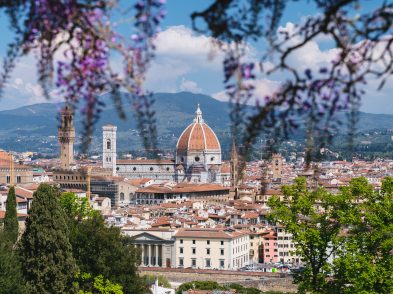Salman Rushdie’s The Enchantress of Florence inspires a fury of
various and contradictory adjectives while simultaneously defying
description-the true mark of a great work of literature.
Make no mistake, the controversial author’s latest work has lofty
literary ambitions; the prose is gorgeous and flowery and fantastical,
oftentimes too much so-as if Rushdie constantly seeks to remind the reader of
his formidable prowess with the written word. Despite the transparent
self-flattery that almost obnoxiously extols the storyteller and his art, Rushdie’s
writing succeeds in a remarkable way, indeed in every way. Thematically and
stylistically, this book is one for the ages; it touches intelligently and
tenderly on the most diverse aspects of the human condition- the highest and
lowest passions of the senses, the deepest loneliness and the most meaningful
companionship, the problem of religion and the identity of the man displaced
from his own country.
The Enchantress of Florence is a daring work, a
skeptical work, and above all a multicultural work that seamlessly weaves
together Eastern and Western culture in a time of new discoveries, new
philosophies, new temptations. Raw humanity screams out from every page of the
book-from the bloody, crowded battle scenes in the streets of Florence to the
poignant portrayal of the plight of a court prostitute in medieval Hindustan.
‘This may be the curse of the human race,’ a character suggests at one point,
‘Not that we are so different from one another, but that we are so alike.’
In a similarly powerful way, the sensuously described landscapes come to
life ferociously. By no means is Renaissance Florence the only environs
enchanted by the author’s golden touch; the expansive and exotic Indian court
of Akbar the Great plays an even greater role and enthralls with perhaps a
greater force. Some episodes take place in the faraway, recently discovered New
World; others transpire in little Tuscan hamlets in the countryside. The
author’s vehicle is thus not a single story from a single point of view but
myriad stories described by a kaleidoscope of human personalities. The primary
storyteller is a mysterious yellow-haired Florentine traveler, but the other
perspectives offered are no less ambitious: the illustrious political
philosopher Niccolo Machiavelli, the all-powerful but enlightened Emperor
Akbar, and even the Emperor’s imaginary-yes, imaginary- but tangibly beautiful
wife Queen Jodha become joint narrators of a story woven together richly and
shamelessly.
‘Shameless,’ in fact, is the best way to describe Rushdie’s work. He
unscrupulously borrows characters from history and literature and weaves them
into the plot, wasting the potential of some and brilliantly profiting from
others. His prose tirelessly shifts between raw vulgarity and refined elegance
in a way that is altogether appropriate for his characters and environments-daring
men and women who shape their own destiny and question traditional roles. These
figures inhabit a harsh world where men are burned alive on the steps of
religious monuments and powerful warlords take concubines by force.
Nevertheless, magic and imagination are omnipresent-more durable than religion
or governments or beliefs. Above all is the magic found in the gaze of a woman,
the Enchantress of Florence herself-Qara Koz, the most beautiful woman in the
world-one of the most enthralling characters in recent literature.
Some of the book’s best moments are simply too tragic and disturbing to
be described here, but the sadder moments always reveal a deeper sense of
beauty. The author fears no subject and surrounds all his musings with an
undying faith in the power of the written word. In the hedonistic and
contradictory environments of Renaissance Florence and the court of the Grand
Mughal of Hindustan, Rushdie confronts Machiavelli and Mohammed, Allah and amore-and
spares no one and nothing at the altar of imagination and storytelling.




